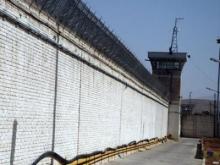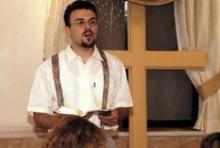
Rajaee Shahr prison in Karaj, Iran. (Photo: Iranian.com)
(CNSNews.com) – The Iranian prison where American pastor Saeed Abedini is now being held is “regarded as one of Iran’s harshest jails because of its high number of cases of torture, rape and murder,” according to press freedom watchdog Reporters Without Borders.
Human rights groups have long received reports from relatives of political and other prisoners held at Rajaee Shahr (Rajaishahr) prison in Karaj, near Tehran, about the conditions there, including claims of serious violence, overcrowding, torture and denial of medical attention.
The American Center for Law and Justice (ACLJ), which is acting for Abedini’s family, learned this week that Iranian authorities had moved him on Sunday from Tehran’s Evin prison, where he has been incarcerated for more than a year, to Rajaee Shahr.
“Pastor Saeed has been placed in a 3m by 3m cell (approximately 10ft by 10ft) with five other inmates in the ward reserved for murderers and rapists,” ACLJ Executive Director Jordan Sekulow wrote in a letter to President Obama, urging him to speak out “directly and forcefully” to save the pastor’s life.
He quoted a Dutch diplomat’s description of the prison as a place where “political prisoners have to share cells with dangerous criminals like murderers, rapists and drug addicts who don’t hesitate to attack their cell mates. They have nothing to lose: many of them are condemned to death anyway. Murders or unexplained deaths are a regular occurrence.”
Sekulow said Abedini’s transfer to such an environment “appears designed to afford the Iranian regime political cover should Pastor Saeed be either severely injured or killed by fellow inmates.”
He recalled that Obama during his September phone conversation with Iranian President Hasan Rouhani had urged him to release Abedini.
“This new and extremely dangerous development is deeply troubling and once again requires the intervention of the administration at the highest levels,” he wrote.

Iranian-born American pastor Saeed Abedini has been behind bars in Tehran since last September. An appeal court this week upheld an eight year prison sentence for supposed national security offenses. (Image: ACLJ)
Abedini, a 33-year-old American citizen, convert from Islam and ordained evangelical pastor, was arrested while on a family visit last September, convicted on charges of “crimes against national security,” and sentenced last January to eight years’ imprisonment.
The pastor’s Boise, Idaho-based wife, Naghmeh, said in a statement Tuesday she was “devastated” by the news of her husband’s transfer to Rajaee Shahr.
“I am more concerned now about his safety than at any other time during his imprisonment. I can only imagine the torment and anguish he is experiencing. He is truly defenseless in this prison – defenseless from the abuse and violence of other prisoners – defenseless from a radical government that continues to violate his rights.”
Expressing gratitude for past support, she appealed to Obama and the U.S. government “to fight for Saeed’s life and his freedom.”
Lice, waste, vomit
The Dutch diplomat cited in Sekulow’s letter to the president, Loes Bijnen, was a human rights specialist based at the Dutch Embassy in Tehran from 1999 to 2004. She originally wrote the description of Rajaee Shahr for a reformist Iranian publication in 2005.
In an update five years later, Bijnen said the situation had worsened in the intervening period. She quoted from a letter smuggled out of the prison from an inmate serving a life sentence:
“This is a different world, much like the Hell depicted in movies, full of fire and smoke,” the prisoner wrote. “A world filled with burnt, black, disheveled faces, naked bodies covered with sweat and red marks from the sting of lice. A world filled with torn trousers, scraps of which are used as belts; bare and filthy feet; clothes worn inside out and covered with lice; torn, mismatched slippers. A world in which you are exposed to polluted air, the extreme smell of putrid waste, overflowing sewage from toilets, the toxicity of dry vomit, infectious phlegm, and the body odor from bodies in close proximity, rarely given the opportunity to bathe – all coming to a climax with the smell of urine by those who are unable to control themselves.”
“Rajaishahr prison in Karaj, a town to the northwest of the capital … is one of Iran’s most troubled prisons, with a reputation for torture, rape and murder,” Reporters Without Borders said in a 2011 report on the plight of seven Iranian “netizens” found guilty of actions against national security and anti-government propaganda.
“Their lives are in danger. Some of them have been injured in knife attacks by fellow inmates,” it said.
One of the political prisoners held there is Heshmatollah Tabarzadi, head of the banned opposition group the Democratic Front of Iran, sentenced in October 2010 to eight years in prison (he had earlier served a nine-year term).
In August 2011 his son told the International Campaign for Human Rights in Iran (ICHRI) that his father’s health had deteriorated in the prison, citing “confined space, lack of ventilation, and poor nutrition.”
Another glimpse of the conditions was given to ICHRI in October 2011, when the father of a Kurdish political prisoner, Zanyar Moradi, said relatives had taken warm clothing to the prison with the arrival of the cold season, but were told that as he was on death row and would be executed anyway, he would not need them.
Zanyar Moradi himself, in an open letter smuggled out from the prison last January, claimed that he and his cousin and co-accused, Loghman Moradi, had been tortured for nine months.
“They would beat us so hard that we could not walk, even today I still suffer from side effects of torture – my back is hurting and I have two fractured vertebrate. The torturers told us that if we did not confess to everything they told us that they would rape us and we just signed whatever they put in front of us. And now we are waiting for the hanging rope of death.”
In June 2012, representatives from the Campaign to Free Political Prisoners in Iran briefed members of the European Parliament on the situation faced by political prisoners in Rajaee Shahr, charging “systematic denial of medical attention”.
A summary of the meeting said they had outlined a “new scheme adopted by the Islamic regime, which is gradually killing of ailing political prisoners by depriving them from an urgent medical attention they need.”
Last June, political prisoner Afshin Osanloo, serving a five-year sentence on charges of “collusion and assembly with the intent to act against national security,” died in Rajaee Shahr, reportedly of a heart attack. His family called for an investigation into the 42 year-old’s death.
Source material can be found at this site.









